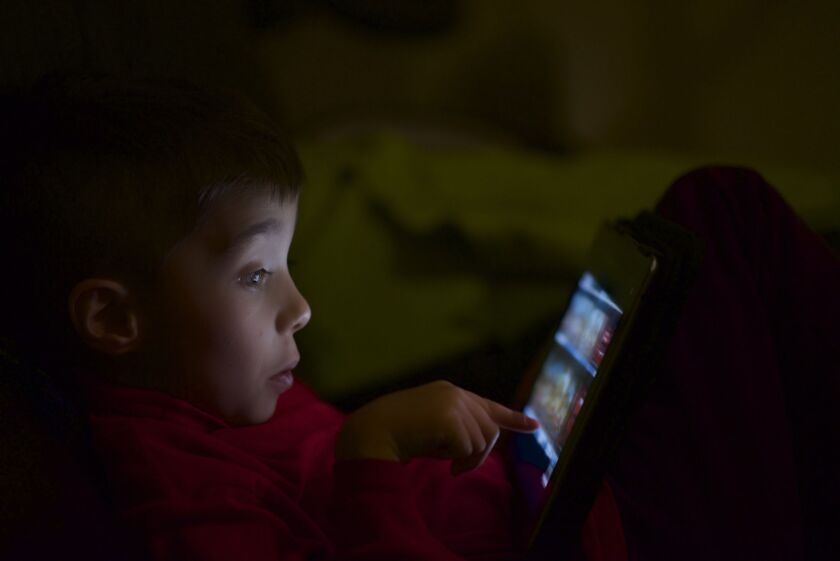These are among the darkest days of the year — or they would be, if we lived like our ancestors, with nothing but the stars and moon to light our way between sunset and sunrise.
Instead, most of us live in cities and towns illuminated by street lights and in homes lit by lamps, ceiling fixtures, cell phones, tablets, computers and TV sets. For the 15 million Americans who work night shifts, the lights stay on all night.
All that artificial brightness has benefits. We can read our e-books, post on Facebook or make a living at any hour. But there also are possible health risks when we get too much of the wrong kind of light at the wrong time.
And that’s exactly what many of us are doing, some research suggests.
“Light is a stimulus that can have impacts on health, well-being and performance,” for good and ill, says George Brainard, professor of neurology at Thomas Jefferson University.
Light has this power because it drives our central circadian clock. Ideally, that internal clock produces daytime alertness and nighttime sleepiness on a predictable 24-hour schedule. Receptors in our eyes play key roles, taking their cues from the intensity and wavelengths of light we are exposed to each day and night.
Bright natural daylight is rich in blue wavelengths that can alert us and suppress the release of melatonin, a hormone that helps us fall asleep. When we get bright light, especially bright blue light, at night, it can disrupt sleep and might even contribute to weight gain, cancer susceptibility and other health problems, some studies suggest.
“No one is saying we should turn off all the lights,” says Mario Motta, a cardiologist in Salem, Mass., who has worked with the American Medical Association (AMA) to bring attention to nighttime light exposure. But, he says, it is time to take some steps to reduce possible harms.
The World Health Organization also has also chimed in, saying that nighttime shift work is linked with higher breast cancer rates. Chronic nighttime light exposure and suppression of melatonin, which has anti-cancer effects, could be at least partly to blame, the group says.
Still, research remains “in early days,” Brainard cautions. He is leading a study of an LED (light-emitting diode) lighting system for the International Space Station that will create bright blue light early in the day, a mid-range white light for working hours and dimmer, warmer light before bedtime. If it works, astronauts will be more alert and productive during the day and able to sleep better at night — and the rest of us might learn a few things too.
“But there’s a real need to test this and make sure it works the way we think it will work,” he says.
For now, here’s what earthbound humans should know about:
THE BIG PICTURE/strong>
The less bright light you get during the day, the more susceptible you are to light disruption at night. So a hermit-like office worker may be more affected by a night of Web surfing than an outdoor construction worker would be. An office worker who takes an outdoor daytime walk might get some protection.
STREET LIGHTS
In a 2016 report, the AMA suggested communities avoid the use of bright LED street lights with high blue light levels. It noted that warmer versions are available. The intense lights can cause dangerous glare, especially for older drivers, and might contribute to poor sleep and other health harms in heavily-lit neighborhoods, the group said.
Mark Rea, director of the industry-supported Lighting Research Center at Rensselaer Polytechnic Institute, is skeptical that street lights will turn out to be important circadian disrupters. “You are not looking directly at the light fixture and you are not out there long enough to be affected,” he says.
And, he says, there are ways to install and adjust LED street lights that should minimize glare.
ELECTRONIC DEVICES
Some research suggests nighttime use of blue-light emitting computer, tablet and phone screens might disrupt sleep. In one small experiment, readers were asked to use either tablets or paper books at night. Tablet users took longer to fall asleep and were less rested the next day.
But any such effects depend “on how far away it is from your eyes, how bright it is, how much blue light it emits,” and how much light you get during the day, says Charmane Eastman, a professor of behavior sciences at Rush University Medical Center.
It makes sense to turn off devices in the hour or two before bedtime, says Mariana Figueiro, a professor at the Rensselaer lighting center. “If you can’t turn it off, dim it down and turn down the color if you can,” she says. You can turn down the blue light on an iPhone or iPad by choosing the “night shift” setting.
HOME LIGHTING
While lab studies show almost any amount of light at night can suppress melatonin, “the evening light levels in homes are extremely low,” and unlikely to cause major problems, Rea says.
Still, all bulbs sold for home use — whether incandescent, fluorescent or LED — are rated for for brightness (lumens) and color (with kelvin scores, typically ranging a warm amber 2500 to a cool blue 6500). And some LED lighting systems allow users to adjust color and brightness. So homeowners who want warmer, dimmer light at night can get it.
Kim Painter, Special for USA TODAY






